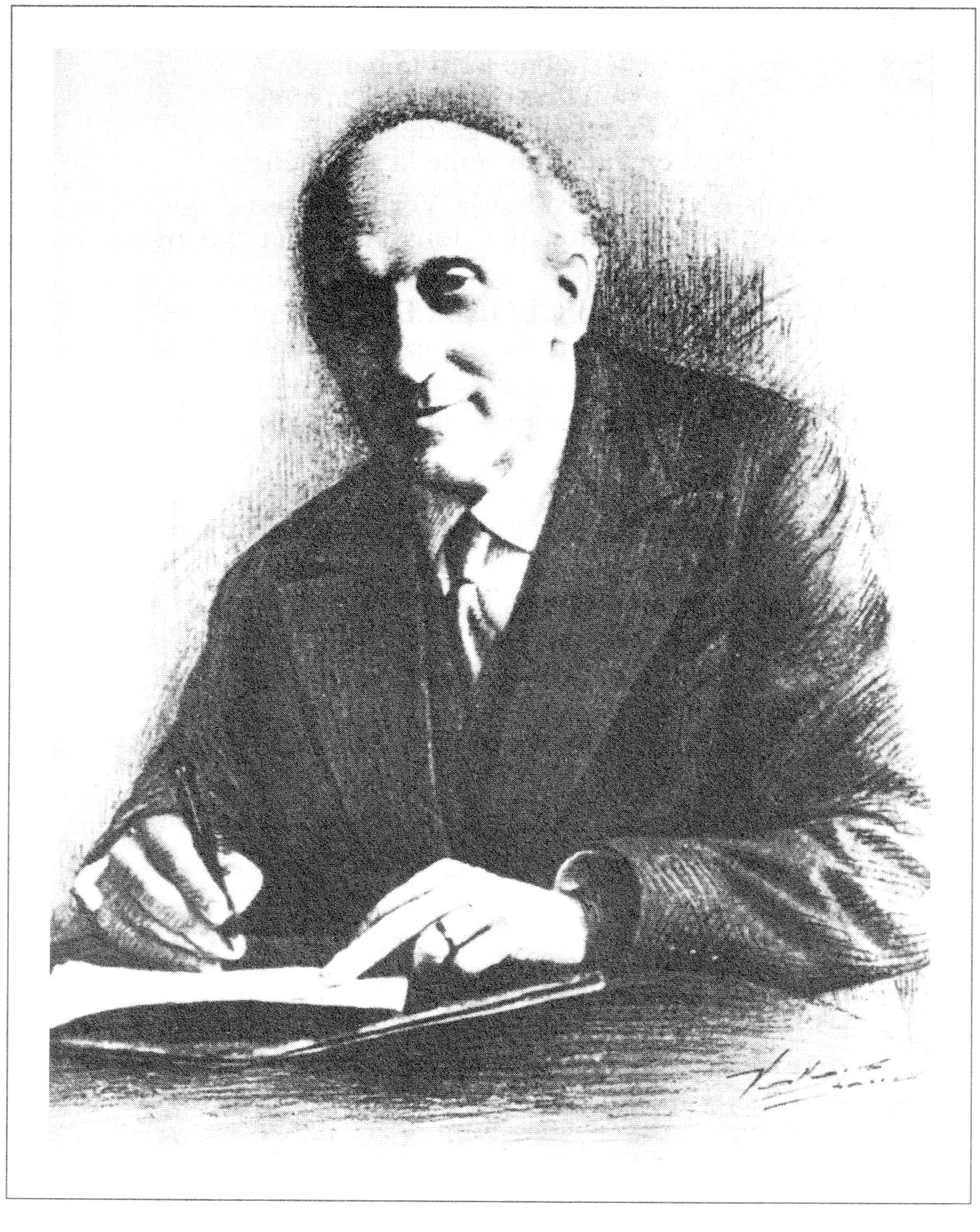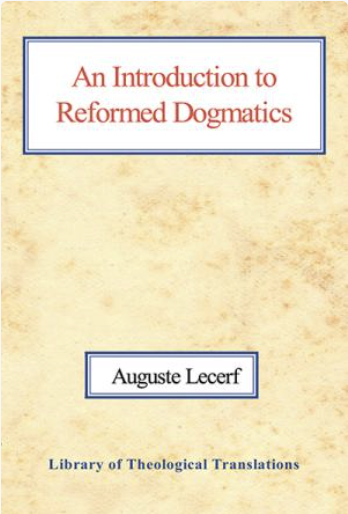
Auguste Lecerf (1872-1943) was a French neo-Calvinist theologian. He was born in 1872 in London.
He studied at the Faculty of Protestant Theology in Paris. His thesis was on determinism and responsibility in Calvin’s system. He was involved in pastoral ministry for almost twenty years in Normandy, and for four years he was a military chaplain. In 1922, he returned to Paris to become a professor in the Protestant Faculty of Theology at the University of Paris. He remained there until his death, in 1943.
His main work is An Introduction to Reformed Dogmatics, it was translated into English by S. Leigh-Hunt (London: Lutterworth Press, 1949). He also wrote Catéchisme de Genève (1934) and Études Calvinistes (1949).
He was a major influence on two other key French Reformed theologians Pierre-Charles Marcel and Pierre Courthial. It was Lecerf who encouraged Pierre Marcel to study Herman Dooyeweerd.
Lecerf was the founder of the French Calvinist Society and editor of its Bulletin.
A translation of Lecerf’s “De l’impulsion donnée par le calvinisme à l’étude des sciences physiques et naturelles.” is available here: “‘The Calvinistic Impulse for the Sciences’ by Auguste Lecerf.” Neocalviniana (April 2024).

Steve Bishop, 2024. “Auguste Lecerf: The Most Influential French Neocalvinist of the Twentieth Century.” Neocalviniana, April.
Excerpts (and short introductions by Kevin Davis) from An Introduction to Reformed Dogmatics are available here.

Renato Coletto remarks in Traces of neo-Calvinism in France and Italy. Koers, 75(1): 149-172:
One of the first traces of reformational scholarship [in France] can be found in the writings of Auguste Lecerf (1872-1943), a man of remarkable personality, from Paris. The third chapter of his famous Introduction à la dogmatique réformée (Lecerf, 1938) deals with “Calvinism and philosophy”. There the reader may be surprised to discover that long before Dooyeweerd lectured in France, Lecerf (1938: 41) mentions “les philosophes réformés Dooyeweerd et Vollenhoven” and shows familiarity with their ideas. Even more surprising is the fact that he discussed the two reformational philosophers before 1938, in a series of scattered articles which were published posthumous with the title Calvinist studies (Lecerf, 1949). Those studies were the object of intense dialogue with the famous French philosopher Étienne Gilson (1884-1978) who argued with Lecerf from a Roman Catholic point of view, in his Christianity and philosophy (Gilson, 1936). With this, reformational thinking was brought to the attention of the “top level” philosophers of France.

Selected bibliography of Lecerf
1895. Le déterminisme et la responsabilité dans le syste ̀ me de Calvin. Paris: Imprimerie Jouve.
1932a. “Calvinism. The Present Position: In France.” In The Reformed Faith Commonly Called Calvinism. Report of the International Conference of the Sovereign Grace Union Held in May 1932, 149–52. London: Sovereign Grace Union.
1932b. “The Reformed Faith in France: An Historical Survey.” Evangelical Quarterly 4 (4): 391–97.
1937. “Émile Doumergue: Pionier van de herleving van het Calvinisme in Frankrijk.” Translated by C. Beekenkamp. Antirevolutionaire Staatkunde: Maandelijksch Orgaan van de Dr. Abraham Kuyperstichting 13: 145–51.
1938. Introduction a ̀ la dogmatique réformée. 2 vols. Paris: Éditions “Je sers.”
1949a. An Introduction to Reformed Dogmatics. Translated by Stephen Leigh-Hunt. London: Lutterworth.
1949b. Études Calvinistes. Edited by André Schlemmer. Paris: Delachaux & Niestlé.
2024. “‘The Calvinistic Impulse for the Sciences’ by Auguste Lecerf.” Neocalviniana (April 2024).
On Lecerf:
Renato Coletto Traces of neo-Calvinism in France and Italy. Koers, 75(1): 149-172:
Steve Bishop 2024. “Auguste Lecerf: The Most Influential French Neocalvinist of the Twentieth Century.” Neocalviniana, April.
F. F. Bruce, 1950. “Lecerf and Reformed Dogmatics.” Evangelical Quarterly 22 (1): 69–70.
André, Encrévé, and Calvin Tams. 2011. “Lost, Then Found: Calvin in French Protestantism, 1830–1940.” In Calvin and His Influence, 1509–2009, edited by Irena Backus and Philip Benedict, 224–54. Oxford: Oxford University Press. https://doi.org/10.1093/acprof:oso/9780199751846.003.0012.
Maurice Goguel, 1994. “Auguste Lecerf: Le Collège.” La Revue réformée 45 (1–2): 9–11.
Pierre Marcel, 1950a. “Professor Lecerf and French Calvinism.” Calvin Forum 15 (6): 117–18.
———. 1950b. “The French Calvinistic Society.” Calvin Forum 15 (7): 147–48.
———. 1950c. “The Present Leaders of the ‘Societe Calviniste de France.’” Calvin Forum 15 (9): 191–92.
Reid, Thomas. 1979. “Auguste Lecerf: An Historical Study of ‘the First of the Modern French Calvinists.’” MA dissertation, Aix-en-Provence: La Faculté Libre de Théologie Réformée.
———. 2002. ‘The heritage of Auguste Lecerf‘ Evangelical Times (March)
Wells, Paul 2009. Auguste Lecerf: Last of the French Calvinists. Originally published in Reformatorisch Dagblad
———. 2017. “A Recent French Reformed Theologian: Auguste Lecerf.” Reformed Presbyterian Theological Journal 3 (2): 4–17.
Bishop, Steve. 2024. “Auguste Lecerf: The Most Influential French Neocalvinist of the Twentieth Century.” Neocalviniana, April.
De Jong, Marinus. 2025. ”Je sors de la solitude enfin” The Genesis of the first French Neo-Calvinst Auguste Lecerf in: Neocalvinismus: Formationen und Vernetzungen einer transnationalen theologischen Bewegung (Vandenhoeck & Ruprecht, 2025)